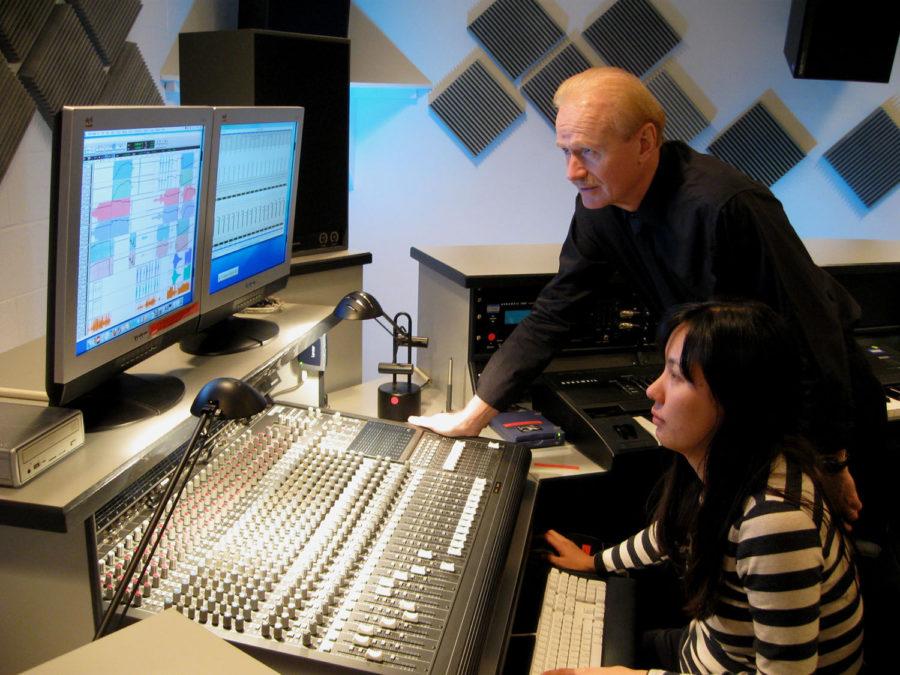Experimental Music Studios create its own dialect
February 25, 2015
Tucked away at the top floor of the music building, students are creating modern sounds of manipulated notes and synthesized tones where the first developments of electronic and computer music were created.
In 1958, the University constructed the Experimental Music Studios, the first studio space in the western hemisphere to use technology in contemporary music. The six studio rooms and the works produced with them uphold a prestigious reputation globally, said professor Sever Tipei, manager of the computer music project.
“This is a research university,” Tipei said. “For us, research also means creativity, so it is the main place where composers create new works and research.”
Students taking specific classes within the school of music are able to use the studios, but students do not necessarily have to belong to the department to use them. However, they are expected to produce an electro-acoustic composition per semester, said Professor Emeritus Scott Wyatt, director of EMS.
“Electro-acoustic music and computer music are a major part of any musical production nowadays,” Tipei said. “From pop music to very sophisticated concert music, more than half of the musical production worldwide is done in facilities like this. Our students benefit by being a part of a first class facility and instruction.”
Get The Daily Illini in your inbox!
As a research and teaching facility, students and faculty can produce new compositions and develop software for electronic and computer music. Students are continuously encouraged to share their music through performances and competitions, and many have won various awards worldwide. Wyatt said he also believes the mission of the studios is to further students’ musical experience.
“The idea is to assist them in formulating their professional career. What we attempt to do is help them become aware of national and international competitions and assist them with both their compositional skills as well as their engineering skills, because this is a contemporary art form,” Wyatt said.
Being involved with the studios since 1974, Wyatt has worked to continue the legacy of developing successful composers. As technology and the contemporary arts evolve, he makes sure that the studios are updated. Through grants and even money from his own pocket, he hopes to help students become better composers.
“It is a technology center that focuses on the contemporary arts,” he said. “There aren’t many centers like that and as technology changes, the facilities have to change.”
John Nichols III, composer and award-winning EMS graduate student in Music, also believes the studios are a well-maintained legacy on campus offering students valuable opportunities.
“The facilities are consistently operational and a wonderful recording resource,” Nichols said. “Director Scott Wyatt has a flair for studio design and takes great care to ensure all equipment is in working order and the studios are kept clean to facilitate maximal creative development.”
Nichols was encouraged to foster his interest in composing by his parents from a young age. He has been a part of the studios since 2008 and, in addition to his previous accomplishments, has recently been awarded the 2014 Luigi Russolo Grand Prize & 1st Luigi Russolo Award.
“I continue to strive to create the best compositions that I can, and fortunately, competitions allow for people in diverse parts of the world to hear them,” he said. “Still, in my opinion, one should compose for the sake of the composition rather than for the sake of the competition, and if they can do that, maybe someone will recognize it.”
In addition to noteworthy composers, such as Iannis Xenakis, Francis Dhomont and Bernard Parmegiani, he also feels his teachers have impacted his success as a composer and musician. Specifically within the EMS, he has found the faculty to have had a profound effect on his work.
“(Dr. Sever Tipei’s) mentorship challenged me to explicate upon larger musical concerns, such as the organization of a composition,” Nichols said. “He also exposes his students to innovative techniques such as additive synthesis, which can be useful when used alone or in conjunction with the studio methods emphasized by Professor Wyatt.”
The EMS offer students the opportunity to join a program that works towards building high-caliber careers, along with an in-depth background of contemporary music.
“We’ve had students who are now directing facilities elsewhere in the world,” Wyatt said. “We have had students who are working for Disney, Yamaha and other music industry companies. So their hands-on experience here, working with sound, composition and engineering techniques took them into those particular areas of employment.”
Those with a musical background and are looking to make an impact within contemporary music should consider getting involved with the EMS program.
“In difficult times, I couldn’t imagine anything more devastating than losing access to the studios,” Nichols said. “That thought kept me on track, and it still does.”







